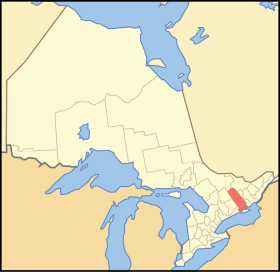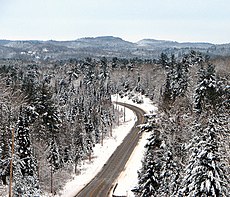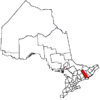Hastings County: Difference between revisions
m →Administrative divisions: rm'd unneeded pipe from wikilink |
|||
| Line 97: | Line 97: | ||
* Town of [[Bancroft, Ontario|Bancroft]] |
* Town of [[Bancroft, Ontario|Bancroft]] |
||
* Town of [[Deseronto]] |
* Town of [[Deseronto]] |
||
* Municipality of [[ |
* Municipality of [[Centre Hastings]] |
||
* Municipality of [[Hastings Highlands]] |
* Municipality of [[Hastings Highlands]] |
||
* Municipality of [[Tweed, Ontario|Tweed]] |
* Municipality of [[Tweed, Ontario|Tweed]] |
||
Revision as of 15:16, 17 January 2019
Hastings County | |
|---|---|
| County of Hastings | |
| Motto: Communities With Opportunities | |
 Hastings County | |
| Coordinates: 44°45′N 77°35′W / 44.750°N 77.583°W | |
| Country | |
| Province | |
| County seat | Belleville |
| Municipalities | List
|
| Area | |
| • Land | 5,291.05 km2 (2,042.89 sq mi) |
| Population (2016)[1] | |
• Total | 39,628 (excluding Belleville Quinte and Tyendinaga) |
| • Density | 7.5/km2 (19/sq mi) |
| • Population (census division) | 136,445 |
| Time zone | UTC-5 (EST) |
| • Summer (DST) | UTC-4 (EDT) |
| Website | www.hastingscounty.com |

Hastings County is located in the province of Ontario, Canada. Geographically, it is located on the border of Eastern Ontario and Central Ontario. Hastings County is the second largest county in Ontario. The county seat is Belleville, which is independent of Hastings County. Hastings County has trademarked the moniker "Cheese Capital of Canada".[2]
Administrative divisions
The 14 local municipalities within Hastings County are:
- Town of Bancroft
- Town of Deseronto
- Municipality of Centre Hastings
- Municipality of Hastings Highlands
- Municipality of Tweed
- Municipality (township) of Marmora and Lake
- Township of Carlow/Mayo
- Township of Faraday
- Township of Limerick
- Township of Madoc
- Township of Stirling-Rawdon
- Township of Tudor and Cashel
- Township of Tyendinaga
- Township of Wollaston
The Tyendinaga Mohawk Territory is within the Hastings census division but is independent of the county. The cities of Belleville and Quinte West are separated municipalities, falling within the boundaries of the county and included in the Hastings census division, but not under the administration of the county government.
History
The first boundaries of Hastings County were established 1792 by Lieutenant-Governor John Graves Simcoe. The southern boundary was the Bay of Quinte, the eastern boundary was Lennox County and the western boundary ran from the Trent River to the Ottawa River, in a triangular shape. The County consisted of Sidney, Thurlow, Rawdon, Huntingdon and Hungerford townships as well as the Mohawk Tract. The area was named for Francis Rawdon-Hastings.
Three new townships; Elzevir, Madoc and Marmora were created in 1821 and on Monday, October 1, 1821 the first Hastings County fair was held in Belleville . The largest prize paid was to Captain Daniel Ostrom of Sydney at $20 and Ruliff Purdy of Sidney received the most prizes totaling $106.50.
While in this time agriculture was the most important industry in Hastings County, by 1822 (when the Marmora Iron Works was approaching its peak production) mining was playing an increasingly more important role in the area's economy.
Prominent citizens of Hastings County and Ameliasburgh Township unsuccessfully petitioned the provincial government for district status during 1817, 1818, 1823 and 1825. After Prince Edward County successfully achieved its own government in 1831, Hastings County continued to send petitions throughout the 30s before finally achieving the status of a separate district in March 1837. Belleville was named the county's District Town.
From 1839 until 1849, Hastings County was renamed Victoria District after Queen Victoria. By 1841 the district had access to local courts but no local government was in place. On February 8, 1842 the Victoria District's first council met under warden William Hutton. During much of this time roads and bridges were the most important issues the council dealt with.
Edward Fidlar became the first warden of Hastings County with their first meeting on January 28, 1850. By this time the Hastings County Council was also interested in education and the building of the railroad.
On October 27, 1856 the first railroad train arrived in Belleville and by 1864 around 100 people were employed by the railroad.
In August 1866, discovery of gold at Eldorado, near Madoc, caused great excitement throughout Hastings County as people flooded to the area from all over North America. According to Barnes, "gold has been found in twenty-seven locations spread over nine townships."[3] The railroads and 170 miles (270 km) of good gravel roads opened these areas to settlement by 1880.
In 1889 the Belleville Waterworks was created as a private company, which was then bought by the city of Belleville in 1889. In 1911, Hastings County was the first in the province to appoint a reforestation committee, which was instrumental in passing laws around county forests. Postal service began in the area in 1913.[4]
Demographics
The figures below are for the Hastings census division, which combines Hastings County, Belleville and Quinte West, along with the Tyendinaga Mohawk Territory.
| 2016 | 2011 | |
|---|---|---|
| Population | 136,445 (1.1% from 2011) | 134,934 (3.4% from 2006) |
| Land area | 6,103.48 km2 (2,356.57 sq mi) | |
| Population density | 22.1/km2 (57/sq mi) | |
| Median age | ||
| Private dwellings | 63,014 (total) | |
| Median household income |
Historic populations:[7]
- Population in 2001: 125,915
- Population in 1996: 126,099
Transportation
The county is served by Highway 401 in the south, Highway 7, a leg of the Trans-Canada Highway, in the central region, Highways 62 and 37 travelling north to south, Highway 28 travelling east to west in the northern region, and Highway 127 travelling north from Maynooth, also in the northern region.
County Council

Warden: Rick Phillips
Town of Bancroft: Bernice Jenckins
Hastings Highlands: Vivian Bloom
Township of Carlow/Mayo: Bonnie Adams
Municipality of Centre Hastings: Owen Ketcheson
Town of Deseronto: Norm Clark
Township of Faraday: Carl Tinney
Township of Limerick: David Golem
Township of Madoc: Bob Sager
Municipality of Marmora & Lake: Terry Clemens
Township of Stirling/Rawdon: Rodney Cooney
Municipality of Tweed: Jo-Anne Albert
Township of Tudor & Cashel: Wanda Donaldson
Township of Tyendinaga: Rick Phillips
Township of Wollaston: Dan McCaw
Education
Currently Hastings & Prince Edward District School Board operates public schools.
Previously Hastings County Board of Education operated public schools.
Emergency Services
There are 5 EMS stations in Hastings County with Hastings-Quinte EMS HQ located in Belleville, Ontario.
See also
- List of municipalities in Ontario
- Southern Ontario
- Eastern Ontario
- Central Ontario
- List of townships in Ontario
References
- ^ a b c "2011 Community Profiles". 2011 Canadian census. Statistics Canada. March 21, 2019. Retrieved 2012-03-15.
- ^ "Artisanal Cheese". hastingscounty.com. Retrieved 2017-12-07.
- ^ Barnes, Michael (1995). Gold in Ontario. Erin: The Boston Mills Press. pp. 13–18. ISBN 155046146X.
- ^ Historic Hastings by Gerald E. Boyce
- ^ "2016 Community Profiles". 2016 Canadian census. Statistics Canada. August 12, 2021.
- ^ "2006 Community Profiles". 2006 Canadian census. Statistics Canada. August 20, 2019.
- ^ a b "2001 Community Profiles". 2001 Canadian census. Statistics Canada. July 18, 2021.
Further reading
- Boyce, Gerald E. Historic Hastings - Volume One with New Introduction and Expanded Index, Global Heritage Press, Milton, 2013
- Union Publishing Company Farmer's and Business Directory for the Counties of Frontenac, Hastings, Lennox, Addington, Prince Edward for 1899, Union Publishing Company, Ingersol, 1899 (facsimile reprint by Global Heritage Press, Milton, 2010)
- The Intelligencer Directory of the County of Hastings 1879 - 1880, The Intelligencer, Belleville, 1879 (facsimile reprint by Global Heritage Press, Milton, 2006)
- Elizabeth Hancocks and W. E. Britnell Hastings County Marriage Register 1858-69, Global Heritage Press, Milton, 2005
- June Gibson, Indexed by Elizabeth Hancocks, C. G. & Shannon Hancocks Hastings and Prince Edward County - Surrogate Court Index of Ontario, Canada, 1859-1900 ( Wills)- Second Edition, Global Heritage Press, Milton, 2005
- Dan Walker and Fawne Stratford-Devai Victoria District Marriage Register 1839-1858 , Global Heritage Press, Milton, 2000
- Rolph and Clark, Brian Tackaberry Directory of the County of Hastings 1879 - 1880, Rolph and Clark, 1904 (facsimile reprint with new Introduction and new Index by Global Heritage Press, Milton, 1999)


